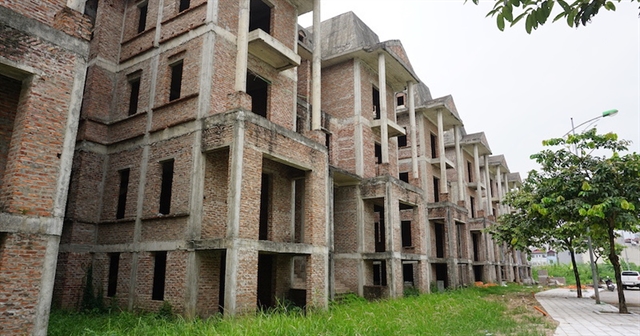Ha Noi has proposed to the Ministry of Finance the imposition of a tax or fine on owners of half-finished and abandoned townhouses and villas which were causing considerable wastes of land resource.

Ha Noi has proposed to the Ministry of Finance the imposition of a tax or fine on owners of half-finished and abandoned townhouses and villas which were causing considerable waste of land resources.
There were a number of projects or parts of projects which were left half-finished and abandoned for years in the capital city, such as Lideco Urban Area, Hinode Royal Park in Hoai Duc District, Xuan Phuong Viglacera and Foresa Villa in Nam Tu Liem District.
Bui Tien Thanh, Head of the municipal Department of Construction’s Urban Development Department, said that the capital city asked relevant departments and local people’s committees to enhance inspections and push developers of these projects to speed up construction.
He added that many projects were now under inspection and needed more time for verification.
Under the capital city’s proposal, owners of townhouses and villas which were left abandoned from three months to less than a year would be imposed a tax rate of five per cent of the value on the contract. The tax rate would be 10 per cent on owners of those left deserted from a year or more.
Administrative fines from VND10 million (US$431) to VND20 million per unit were also proposed for owners of the abandoned villas.
The capital city also proposed a progressive tax on those who owned two houses or more with an aim to prevent speculation.
According to economic expert Dinh Trong Thinh, abandoned houses were causing huge waste while land resources were limited in the capital city.
Taxing owners of deserted properties should be put into consideration with an appropriate tax rate to force these owners to put the properties into use as well as preventing speculation.
However, the reasons why these properties were sitting abandoned must be taken into account for reasonable taxation. Some properties were abandoned due to the poor infrastructure connectivity of the projects and could not be put into use, thus, the tax should be on the developers of the projects instead the buyers of the properties, he said.
It was necessary to develop a specific legal basis and standards to determine which properties were abandoned and the reasons why these properties were left deserted, such as inappropriateness to market demand, unfavourable locations or lack of infrastructure connectivity, he said.
He stressed that not all abandoned properties were the result of speculation.
Experts also pointed out that abandoned properties were evidence for the imbalance of the property market as well as weakness in planning, urging property development to focus more on the real market demand.
Nguyen Quang Thien from Hoang Mai District said that many villas were left deserted while many citizens had to live in cramped houses and housing prices remained unaffordable for many citizens.
This situation reflected an imbalance in supply and demand of the real estate market as well as speculation which was pushing up prices, he said.
Thien said that the Government should raise policies to encourage the development of property products for which the market has demand.
Nguyen Thi Minh Hai, a resident in Gia Lam District, said that not only townhouses and villas but also apartments and land lots were deserted. A reasonable taxation would help tackle this situation, she said, adding that the imposition of a progressive tax on owners of two houses or more should be put into consideration to prevent speculation.
According to Nguyen Van Dinh, Deputy President of the Viet Nam Association of Realtors, taxing abandoned houses would work to prevent waste of land resources.
Dinh, however, said that it was more important to impose tax on deserted land to encourage developers who were capable of investing and making the land profitable.
Former Deputy Minister of Natural Resources and Environment Dang Hung Vo said that the imposition of a tax was effective to prevent the abandoning of properties. The tax rates were very high in many countries and people would hesitate to speculate, Vo said.
At a recent working session with the Ministry of Construction, Prime Minister Pham Minh Chinh said that tax policies should be put into consideration to regulate the market and prevent the capital flow into high-end property segments to speculate while there was a severe shortage of affordable homes for low-income earners. The property development must be association with the social equality and progress, he stressed.
The proposal was first raised in 2012. However, until now, there has been no regulation to impose tax on abandoned houses or villas. Only a tax rate of 0.15 per cent was imposed on abandoned land. — VNS
- Tags
- abandoned villas





